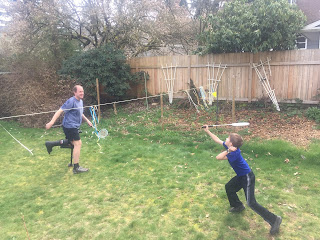-----
This week’s Torah portion, Tazria-Metzora, might be the yuckiest Torah portion. It has instructions about what to do when various disturbances happen with your body (like swellings, or rashes, or bleeding, or pus), or when something weird shows up on your clothes, or on the walls of your house. For example:
When a person has on the skin of his body a swelling, a rash, or a discoloration, and it develops into a scaly affection on the skin of his body, it shall be reported to Aharon the priest or to one of his sons, the priests.
The priest shall examine the affection on the skin of his body: if hair in the affected patch has turned white and the affection appears to be deeper than the skin of his body, it is tzara’at; when the priest sees it, he shall pronounce him unclean. (Leviticus 13:2-3)Ew, right? Gross. And I am not even reading you the grossest parts. You can go read those yourself.
So what we learn is that there is this disease, tzara’at, which shows up as weird scaly patches on your skin, and it is apparently very important, because a priest has to come and examine you to see if it is really tzara’at. [1] And if it is, the priest says you are tamei, which gets translated as “unclean,” though it is a bit of a mystery word. [2] If the priest says someone is tamei, they have to call out “Tamei, tamei!” wherever they go, so that people know. And then, it says – Help me translate. [Here I had the kids work with me to translate the Hebrew, especially the easier lines. This is Leviticus 13:46.]
Kal y’mei -- All the days
asher hanega bo -- the scaly patch is on him
yi-tamah tamei hu -- he shall be tamei, he is tamei
badad yoshev -- Alone sits.
michutz lamachaneh moshavo -- Outside the camp his seat.
This says that if the priest says that someone is tamei, they have to go outside the camp, far away from any of the tents, away from their family, away from their friends, by themselves in the wilderness. Badad yoshev. [3]
- What do you think that would be like??
Sometimes we send someone away from other people for health reasons. When you get a bad cold you can’t come to school; you have to be “outside the camp” for a little while while you recover, to keep everyone else from getting sick. When you get better, you are welcomed back and all is well. Some people think the tzara’at situation sounds like this. You get a skin disease, and you have to go away on your own until you are healed, and then you can come back. This Torah portion also describes how the priest should inspect you to make sure everything is okay before you return, which makes the priest sound like a doctor.
[The kids had a lot of questions about tzara'at, like whether it is contagious (yes) or deadly (no) or curable (yes).]
But actually there are good reasons to think that being sent outside the camp wasn’t for medical reasons; it was for spiritual reasons. There were plenty of diseases that the Israelites suffered from at that time, and they didn’t send you out of the camp for those other diseases. The rabbis say that tzara’at happened not because you had a virus or whatever, but because you did something wrong. In particular, they say that tzara’at happened when you said mean things about people. One reason they said this is that there was a time when Miriam said something rude about Moses’s wife – in fact, she said something racist about her – and G-d punished Miriam by giving her tzara’at temporarily. [4]
So if tzara’at was not a contagious medical condition, why were people suffering from tzara’at sent alone outside the camp? I think one answer is that they were being punished, and I do not like that. But I think another answer is that the Israelites knew that saying mean things about people is, in a way, a contagious disease. For example, I know a bunch of kids at another school who have gotten into saying racist things; it started with just one or two people but unfortunately now it has spread, so that a lot of kids are doing it, and it’s a bad situation. I wonder if maybe those first few kids could have been kept from talking to the other kids for a while, it might not have spread.
These days if we see someone who is sick, we don’t think that means they are being punished. At least I hope we don’t! We know from science that this is not true, and it could be cruel to think that. Even the rabbis knew this was not how things are in our world – they say the punishment of tzara’at was a special thing that only happened in ancient times, like G-d appearing in a pillar of fire.
But what would that be like?
But actually there are good reasons to think that being sent outside the camp wasn’t for medical reasons; it was for spiritual reasons. There were plenty of diseases that the Israelites suffered from at that time, and they didn’t send you out of the camp for those other diseases. The rabbis say that tzara’at happened not because you had a virus or whatever, but because you did something wrong. In particular, they say that tzara’at happened when you said mean things about people. One reason they said this is that there was a time when Miriam said something rude about Moses’s wife – in fact, she said something racist about her – and G-d punished Miriam by giving her tzara’at temporarily. [4]
So if tzara’at was not a contagious medical condition, why were people suffering from tzara’at sent alone outside the camp? I think one answer is that they were being punished, and I do not like that. But I think another answer is that the Israelites knew that saying mean things about people is, in a way, a contagious disease. For example, I know a bunch of kids at another school who have gotten into saying racist things; it started with just one or two people but unfortunately now it has spread, so that a lot of kids are doing it, and it’s a bad situation. I wonder if maybe those first few kids could have been kept from talking to the other kids for a while, it might not have spread.
These days if we see someone who is sick, we don’t think that means they are being punished. At least I hope we don’t! We know from science that this is not true, and it could be cruel to think that. Even the rabbis knew this was not how things are in our world – they say the punishment of tzara’at was a special thing that only happened in ancient times, like G-d appearing in a pillar of fire.
But what would that be like?
- What do you think it would be like if, when you said something mean about someone else, you got scaly patches on your skin? How would you feel?
- Would there be anything good about it? Any benefit to it?
Thank you for sharing your ideas with me!
---
[1] Tzara'at has historically been translated as "leprosy," but it isn't leprosy as we know it. For example the real disease, now called Hansen's disease, is a progressive and disfiguring disease if it's untreated, whereas tzara'at supposedly went away on its own.
[2] I spent some time learning about tamei (and its opposite, tahor) and wow, what a rabbit hole, or PhD thesis if you prefer. Things that convey "uncleanness" include dead human bodies, dead bodies of nonkosher animals, women who just gave birth, men having abnormal discharge from the penis, and women normally menstruating. It takes a lot of effort to construct a concept unifying all these things, especially if you are not going to claim that normal female reproductive activity is abhorrent. I decided not to go there with ten-year-olds.
[3] This is actually the line that strikes at my heart. Badad yoshev; michutz lamachaneh moshavo. Do we not all have a primal fear of this kind of exile? The times that I have perceived myself to be forced to sit "outside the camp," when loved ones seem to refuse to connect with me, are some of the worst times I can remember. When and why do we do this to each other? And what about as a society - who do we force to sit alone, outside the protection and favor of our community? Obviously many people and in many cases for the wrong reasons. I originally thought the d'var would be all about this but I got overwhelmed.



